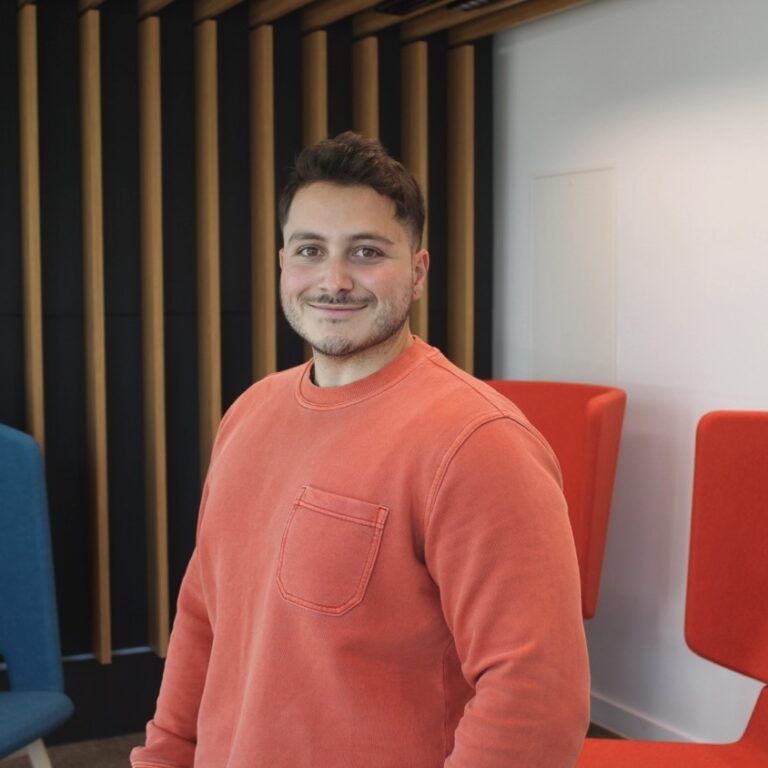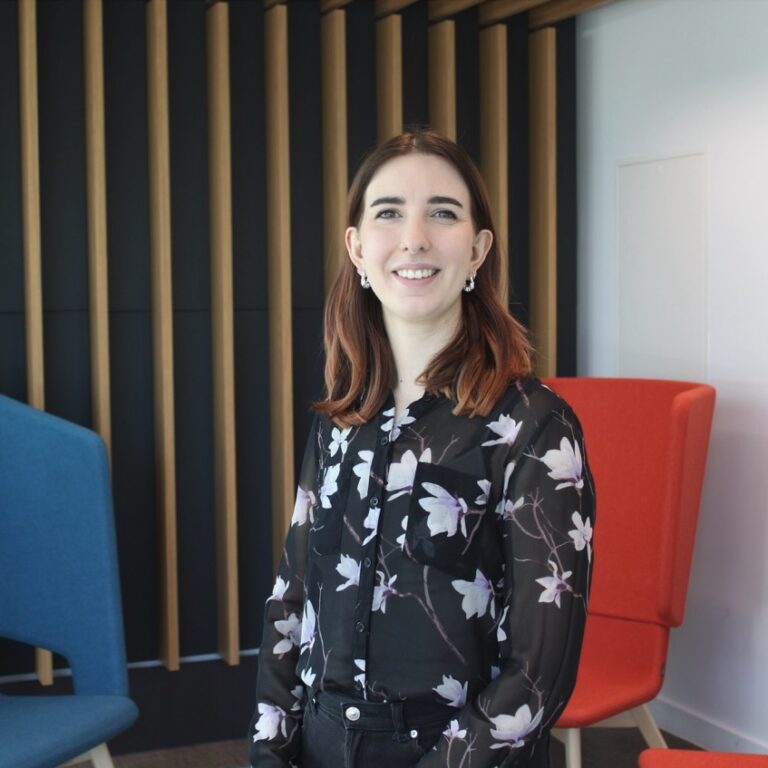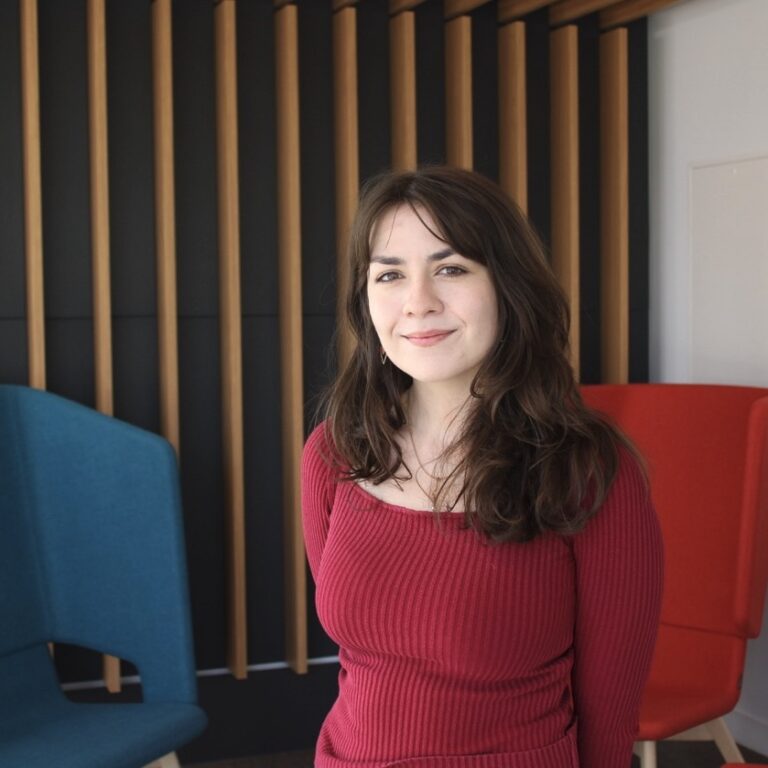On this page you can find answers to some of our most frequently asked questions from postgraduate researchers studying on our CRUK training programmes, including:
- Non-Clinical Studentships
- Clinical Research Training Fellowships
- MB-PhD Studentships
The Manchester cancer training landscape
Discover more information about Manchester’s training landscape and our Postgraduate Researcher (PGR) Representatives.
Postgraduate Researcher (PGR) Representative
Our Postgraduate Researcher Representatives are on hand for current students to discuss any issues you may be experiencing with your programme, help share feedback and offer general advice on studying a PhD.
Postgraduate Researcher Representatives all have access to a dedicated email address, MCRCReps@Manchester.ac.uk, where you can email them with any queries.
Find out more about our three Postgraduate Researcher Representatives below.

Name: Vlasios Gourgiotis
Title: MB-PhD PGR Representative
PhD programme: MB-PhD in Cancer Sciences
Lead Supervisor: Professor Kevin Couper
Location: AV Hill Building, UoM Main Campus
Background: I originally come from Greece, but I began my undergraduate medical studies at The University of Leeds in 2020, followed by a Masters at Barts Cancer Institute. I really hope we can work together in order to make the experience of future MB-PhD students even better. I am based at the AV Hill building, so feel free to reach out and we can grab a coffee on campus! If you would like to have a chat about your MB-PhD experience please feel free to get in touch.
Things I’m happy to discuss: your experiences on the (MB)PhD programme, any feedback you would like to provide, PhD advice.
Email address: MCRCReps@Manchester.ac.uk

Name: Eleanor Richards
Title: Clinical Research Training Fellowship PGR Representative
PhD Programme: CRUK-funded Clinical Research Training Fellowship
Lead Supervisor: Dr Sarah Kitson
Location: St Mary’s Hospital, UoM Main Campus
Background: I’m an Obstetrics & Gynaecology trainee, having completed my Academic Clinical Fellowship in years ST1-3 at the University of Cambridge. I have a Master’s in Public Health, and am particularly interested in addressing gynae-oncology health inequalities with research that could impact national policy. My PhD will include endometrial cancer risk prediction modelling, qualitative assessment of barriers to reducing risk, and health economics analyses.
Things I’m happy to discuss:Any academic or personal issues you’d like to talk through; how to make the most of the opportunities available in the programme; any differences between your expectations of the programme and reality; whether you’d like some casual networking and/ or social events. Or anything else! I love chatting over a cup of coffee.
Email address: MCRCReps@Manchester.ac.uk
 Name: Jasmine Morrison
Name: Jasmine Morrison
Title: Non-Clinical PhD Studentship PGR Representative
PhD Programme: Non-Clinical PhD in Cancer Sciences
Lead Supervisor: Professor Marcel van Herk
Location: Paterson Building, Withington Campus
Background: I first moved to Manchester to complete my MSc in Cancer Biology and Radiotherapy Physics with the University of Manchester. After taking a year to work in industry I started my PhD in Cervical Cancer, where I research the physiology changes of tumours linked to radiation therapy.
Things I’m happy to discuss: Concerns or suggested changes you wish to propose related to the MCRC postgraduate research programme. Any other feedback you wish to be communicated!
Email address: MCRCReps@Manchester.ac.uk
Established in 2013, the CRUK Manchester Centre is a translational research centre that unites basic, translational and clinical research in order to deliver cancer precision for all across seven key disease sites.
As a CRUK Centre, we receive CRUK training funding to recruit postgraduate researchers onto our PhD programmes. This includes our annual clinical and non-clinical PhD training schemes and our MB-PhD studentships.
The CRUK Manchester Centre benefits from strong existing partnerships. Below are some of our key strategic partnerships that form the cancer training landscape in Manchester.
The Manchester Cancer Research Centre
The MCRC is a collaborative partnership founded in 2006 by The University of Manchester, Cancer Research UK (CRUK) and The Christie NHS Foundation Trust. Work by Manchester-based, cancer-focused postgraduate researchers cross-cuts these partner organisations.
The Manchester Cancer Research Centre (MCRC) and Cancer Research UK Manchester Centre share a joint Training Office based at the Oglesby Cancer Research Building in Withington.
Cancer Research UK Manchester Institute
Some of our PhD researchers are based in the labs of group leaders at the CRUK Manchester Institute. The CRUK Manchester Institute is a leading cancer research institute within The University of Manchester, spanning the whole spectrum of cancer research – from investigating the molecular and cellular basis of cancer, to translational research and the development of therapeutics.
The CRUK Manchester Institute also has their own Non-Clinical PhD training programme with annual recruitment.
Progression and Policies
Understand more about the processes and policies that impact you and your PhD.
The online eProg system allows postgraduate researchers (PGRs) to track their project milestones and progress. The eProg system is also used by supervisors and PGRs. You can log into eProg here.
The Faculty of Biology, Medicine and Health’s Doctoral Academy handbook is online. This has sections with answers to frequently asked questions, including programme changes, finance/funding and training. The Doctoral Academy website has links to all essential information/contacts/forms.
Postgraduate researchers (PGRs) should follow the processes outlined by the Doctoral Academy and/or UoM HR Services with regards to any changes to their programme and ensure that the MCRC-CRUK Manchester Centre Training Office are also notified.
Clinical Research Training Fellows (CRTFs) and Research Radiographers will be registered as staff members with the University of Manchester (UoM) HR Services and as PhD students with the Doctoral Academy. The PhD is considered to be their full-time job.
CRTFs and Research Radiographers with a lead supervisor/line manager in the School of Medical Sciences/Division of Cancer Sciences should have received a copy of the staff induction handbook. Additional copies can be requested from the MCRC-CRUK Manchester Centre Training Office.
Postgraduate researchers (PGRs) who are staff members should notify the MCRC-CRUK Manchester Centre Training Office of any changes to their programme, such as requests for parental and/or compassionate leave, alongside following the relevant processes outlined by the Doctoral Academy and/or UoM HR Services.
All CRUK-funded PhD researchers should have access to the CRUK PhD Students Network containing studentship/Fellowship policies and relevant news/updates. You can apply for access online and/or can email the CRUK Student inbox with any queries.
All postgraduate researchers are entitled to annual leave. Those registered with the Doctoral Academy only should access their leave entitlement in the online Doctoral Academy handbook. Those registered with the Doctoral Academy and UoM HR Services should access their leave entitlement in their staff induction handbooks. For any queries or copies of the relevant documents, please contact the MCRC-CRUK Manchester Centre Training Office.
PGR reps provide a voice for fellow PGRs in their Division and/or wider cohort and ensure PGRs’ concerns are raised during UoM decision-making processes.
The Doctoral Academy’s PGR rep scheme is a valued part of the PGR community in the Faculty of Biology, Medicine and Health. Rep responsibilities include:
- attending School rep forums to feed back PGRs’ concerns and discuss issues and areas of good practice;
- disseminating useful information to PGRs;
- liaising with fellow reps, PGRs and the local divisional Senior PGR Tutor to arrange activities, such as seminars, socials or induction events;
- School reps will attend the Doctoral Academy Leadership Team monthly meetings, School Postrgaduate Comittee meetings and the Manchester Doctoral College monthly meetings, on a rota basis.
See contact details of current reps – UoM login required. PGR Rep Training is held annually in November. For more information about the role or about the training, please contact doctoralacademy@manchester.ac.uk.If you have been particularly impressed by the actions of your local PGR Rep, there is a PGR Representative category in the PGR Excellence Awards.
The University Student Union has a dedicated Postgraduate Students Hub, designed to be a central point for updates from your Postgraduate Officer, as well as finding out about the events and support available for postgraduates.
Funding and Financial Support
Discover more about the funding in place to support you and your PhD
Cancer Research UK-funded PGRs must acknowledge their funding using the wording below. CRUK-branded PowerPoint templates and logos are available from the MCRC-CRUK Manchester Centre Training Office.
CRUK Manchester Centre Non-Clinical Students (Programme Start Date From September-October 2022 Onwards)
This work was supported by Cancer Research UK via funding to the Cancer Research UK Manchester Centre and their Non-Clinical Training Programme [CANCTA-2022/100005].
or
[NAME] is funded by the Cancer Research UK Manchester Centre Non-Clinical Training Programme [CANCTA-2022/100005].
CRUK Manchester Centre Non-Clinical Students (Programme Start Date Before 2022)
This work was supported by Cancer Research UK via funding to the Cancer Research UK Manchester Centre [C147/A25254] and their Non-Clinical Training Programme.
or
[NAME] is funded by the Cancer Research UK Manchester Centre [C147/A25254] Non-Clinical Training Programme.
CRUK Manchester Centre Clinical Research Training Fellows and MB-PhD Researchers (Programme Start Date From September-October 2019 Onwards)
This work was supported by Cancer Research UK via funding to the Cancer Research UK Manchester Centre [C147/A25254] and their Clinical Academic Training Award [C19941/A28707].
or
[NAME] is funded by the Cancer Research UK Manchester Centre [C147/A25254] and their Clinical Academic Training Award [C19941/A28707].
CRUK Manchester Centre Clinical Research Training Fellows (Programme Start Date Before September-October 2019)
This work was supported by Cancer Research UK via funding to the Cancer Research UK Manchester Centre [C147/A25254] and their Clinical Training Award.
or
[NAME] is funded by the Cancer Research UK Manchester Centre [C147/A25254] Clinical Training Award.
International Alliance of Cancer Early Detection (ACED)
This work was supported by CRUK via the funding to Cancer Research UK Manchester Major Centre [C147/A18083] and [C19941/A27859]
Contact Stephanie Ng with any ACED-specific training and development queries.
CRUK RadNet Manchester Non-Clinical PGRs and Research Radiographers
This work was supported by Cancer Research UK RadNet Manchester [C1994/A28701].
Contact Clare Dempsey or Lauren Hewitt for the official CRUK RadNet Manchester slide deck.
All CRUK Manchester Centre PhD students/fellows will have a University R code and separate task codes for use with Key Travel and for non-Key Travel consumable/running costs. Details of these can be obtained from Georgina Binnie-Wright. When putting through costs requiring signatures from authorised signatories on your account, you must ensure that you have provided them with as much notice as possible to account for possible staff absences/annual leave.
The University of Manchester has a Living Cost Support Fund designed to support students experiencing unforeseen circumstances or financial hardship. The fund is what was known as the Manchester Hardship Fund and provides financial support to ALL students, regardless of level of study, nationality, or social background. It is open all year round and can award grants to help you overcome financial hardship or unforeseen expenses.
We would encourage all PGRs to also speak to their supervisor/s and/or advisor so that they can signpost you to any additional support.
CRUK PGRs can access UoM Open Access block funding – see here for further details. If the UoM block grant has been exhausted, PGRs should discuss using project consumable underspends for Article Processing Charges (APCs) with their lead supervisor. CRUK PGRs must ensure they are complying with CRUK’s Open Access policy, as detailed here.
Each supervisor receives a budget from CRUK for studentship/Fellowship costs, including for conference attendance and development opportunities. Your lead supervisor should be your first point of contact regarding available funding for conference attendance and/or society memberships.
The Doctoral Academy Conference Support Fund is available for Faculty of Biology, Medicine and Health postgraduate research students to present (oral or poster presentation) at a national or international conference. Funding is provisional until evidence is provided of acceptance of an oral or poster presentation at the stated conference. Payment of expenses is dependent on completion of the Doctoral Academy Conference Support Fund Evaluation Form (Word, 53KB). Individual awards will be made up to a maximum of £500.
The Doctoral Academy Society Support Fund is available to all students who are active on a postgraduate research programme (i.e. not during submission pending or under examination) in the Faculty of Biology, Medicine and Health. It will pay £50 towards one annual membership fee during the period of the programme only. Postgraduate researchers will need to complete a PR7 form and email this to docoralacademy@manchester.ac.uk with a copy of the confirmation of booking/receipt from the relevant society. They may wish to check eligibility before joining the society.
Relevant societies and member organisations include but are not limited to:
- The British Association of Cancer Research
- The Royal College of Radiologists
- The European Society for Medical Oncology (ESMO)
- The European Association for Cancer Research (EACR)
- The British Society of Interventional Radiology (BSIR)
Please also see Cancer Index’s list of national and international cancer organisations.
Health and Wellbeing
Supporting you throughout your PhD
Details of University of Manchester student support services are available here. Details of the University’s counselling and mental health services can be accessed here.
Your supervisory team and academic advisor should be your first point of contact for issues relating to your project.
You can also approach your Division PGR Tutors or Senior Division Tutors for issues that you do not want to discuss with your supervisory team.
If you are not sure where to direct your query please contact doctoralacademy@manchester.ac.uk or visit the Research Hive’s Wellbeing Page for PhD-specific information.
We believe that the best science is born out of an open, inclusive, collegial and safe environment. We believe that bullying, harassment and discrimination of any kind are never OK and have no place in a society.
Each of our partner institutions have anonymous support in place for anyone who has experienced bullying or harassment of any kind. Please see here for further details.
Career Development
Discover how your Phd will enable you to become a future cancer leader
The Doctoral Academy’s Training Programme is delivered in partnership with the University’s Researcher Development Team and provides foundation and intermediate level training at key stages of your postgraduate research degree to ensure timely completion, generic skills development and increased future employability.
The Faculty of Biology, Medicine and Health’s Centre for Academic Researcher and Development (CARD) have developed a wide range of training packages that support career advancement at all stages of YOUR research career. They cover topics including:
- research publishing
- research presentation
- research practice, governance and stakeholder engagement
- qualitative and quantitative research methods
- steps to independence
The Faculty’s Fellowship Academy provides bespoke one-to-one advice and guidance on CVs and applications, together with preparation for fellowship interviews. The Academy creates a network that brings together our externally funded fellows, both clinical and non-clinical, as well as drawing on the experiences of senior academics who sit on external panels and those who hold fellowships themselves.
The Academy will be of particular interest to postgraduates who are:
- in the final year of your PhD with a strong CV and planning an early career postdoctoral fellowship;
- an academic clinical fellow or an academic clinical lecturer;
- a postdoctoral researcher planning an external fellowship application;
- an existing external fellowship holder who is working out how to apply for the next level of award.
Follow-up funding includes that offered by the University’s Integrated Clinical Academic Training (ICAT) team, who provide clinical trainees at all stages of their career with opportunities, and support to engage in research and academic training.
This provision includes:
- Academic Clinical Fellowships: 3-years (4-years for GP), leading to training fellowship and/or
- Academic Clinical Lectureships: 4-years, or up until certificate of completion of training (CCT)
ACL medic posts are usually advertised online in June, October and January. For further details, please contact the Integrated Clinical Academic Training Administrator.
The MCRC-CRUK Manchester Centre, DCS and FBMH run regular careers-focused training sessions and the MCRC-CRUK Manchester Centre Training Office keep PGRs and alumni up-to-date with relevant training opportunities.
The Faculty’s Fellowship Academy support researchers to apply for fellowships, from doctoral studies upwards. Please see here for further information.
The University currently offers an open access course about inclusive research, targeted at researchers, from early career onwards, who work in translational clinical research, also known as ‘bench to bedside’ research.
We recommend that all eligible researchers complete this online course.
Widening Participation and Outreach
Your PhD isn’t just about research – it’s a time for you to develop yourself.
Find out more about the widening participation activities you can undertake as part of your studies in Manchester.
The University of Manchester advertises annually for PhD Widening Participation (WP) Fellows to develop and deliver presentations and workshops promoting Higher Education study to pupils in high priority WP schools and colleges. Please contact sophie.flieshman@manchester.ac.uk for more information. You can gain a deeper understanding of what is meant by WP here.
The Manchester Access Programme (MAP) is the University’s central WP scheme for local Year 12 students in Greater Manchester and recruits annually for academic tutors. Email map@manchester.ac.uk for further details.
Cancer Research UK-funded PGRs are encouraged to make use of these opportunities and can update MCRCTraining@manchester.ac.uk on their outreach activities.
Keeping in Touch
Find out how you can keep in touch with our training team to get the most out of your PhD.
The MCRC-CRUK Manchester Centre produce a bi-annual Training & Education Newsletter and welcome new contributions from postgraduate researchers and postdocs. These can be sent to MCRCTraining@manchester.ac.uk.
Previous issues can be accessed here
The Manchester Cancer Research Centre (MCRC) produce a regular news bulletin which contains details of cancer research events, funding and training opportunities relevant to CRUK-funded PGRs. You can subscribe on the MCRC website.
You can also follow the MCRC on Twitter and Linked In and follow the CRUK Manchester Centre on Linked In. The CRUK Manchester Centre can be listed as your employer on Linked In (or CRUK Manchester Institute if based in a CRUK MI group).
Navigation
Why Manchester?
Find out why postgraduate students choose to study in Manchester.
Researcher Stories
Read first-hand experiences of from cancer scientists from across Manchester.
Study
Discover the postgraduate cancer research training opportunities available in Manchester.
Get in Touch
Contact Dr Georgina Binnie-Wright, Postgraduate Programme Manager who manages our postgraduate training programmes
Cancer Research UK Bespoke Curriculum
Our Cancer Research UK Bespoke Curriculum provides training to MB-PhD, Clinical, and Non-Clinical cancer-focused PhD students to develop skills and become inclusive cancer research leaders of the future.





